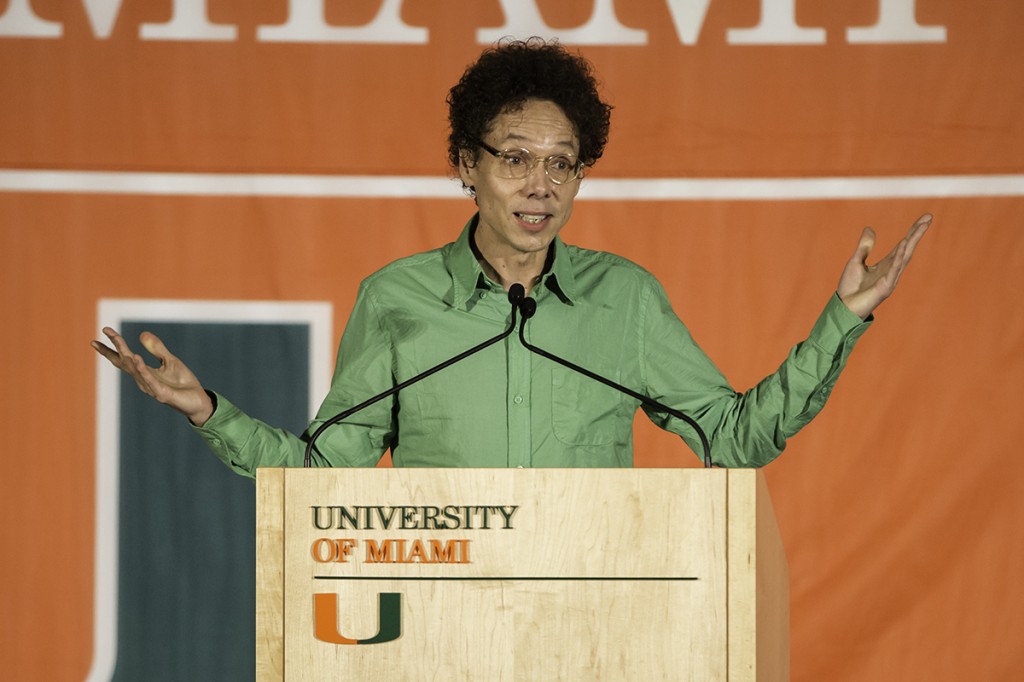
Author Malcolm Gladwell referenced the Kardashian sisters, Kanye West lyrics and a 19th-century duchess to introduce the theme of his latest book “David and Goliath: Underdogs, Misfits, and the Art of Battling Giants,” which challenges the way people think about obstacles.
The five-time New York Times bestselling author spoke Tuesday night at the Student Activities Center. He connected a wealthy duchess’s story to relatable examples of extravagance like the Kardashian sisters. This story illustrated how people misunderstand advantages and disadvantages.
“He’s got a really unique perspective of the world,” graduate student Barrett Dennison said. “He kind of looks for the hidden facts that no one really thinks about. He’s got a really unique kind of perspective, so I think we all need to take a step back and think about how the little things influence the big things.”
The Miami Hurricane and other student media outlets had a chance to sit down with Gladwell and ask him about his inspiration, advice and why students should think twice before attending UM.
The Miami Hurricane: Where did the idea for this book come from?
Malcolm Gladwell: Well from a number of places, but I had done a story for The New Yorker a number of years ago about a guy who coached his daughter’s basketball team, and they were completely without talent and they went all the way to the national championships. I loved the story so much and got such interesting feedback that I thought it would be fun to write a more in-depth explanation of the role of the underdog and the strategies that underdogs use.
TMH: What message do you hope college students get from your book, “David and Goliath?”
MG: Two chapters of the book are specific to education. One chapter is all about how you should think twice about going to the best school you can get into. So I guess I would say that students that go to the University of Miami should think seriously whether it was the right choice; this is a very good school. No, but I think the intention of that chapter is to make people understand that the question of where do you go to school, how do you choose to educate yourself, is more complicated than we are currently imagining or pretending in America.
We have a very narrow set of metric that we use to evaluate the quality of schools. And those metrics are misleading. Basically, you look at something like the U.S. News Ranking system. It’s simply a ranking system that ranks colleges according to one criteria, which is how closely they resemble Harvard University. Now that’s the dumbest thing imaginable because not everyone should go to Harvard University. There’s a whole range of reason why you wouldn’t want to go to a school like that. So my chapter is an attempt to get people to understand that these kinds of questions that turn on the issue of what an advantage is are more complicated than they appear.
TMH: In your article featured in Relevant Magazine, you mentioned how you knew the kind of book you wanted to write and then you met Wilma Derksen, and her experience not only changed the direction of your writing, but also had a personal impact on your life. Could you talk about that impact and how it affected your writing?
MG: When I write books, I don’t have them planned out before I start, so the book evolves as I write it, but halfway through the book I found myself writing a lot more about what I call in the book “weapons of the spirit,” the notion that what’s inside people’s hearts is ultimately far more crucial than material things.
So that courage, anger, perseverance, faith are all things ultimately more consequential in explaining why things happen than money, troops, power, those kinds of things. And that crystallized for me when I met this very remarkable woman, Wilma Derksen, and there were a series of things that would happen, but she was the most striking. Here was a woman who, as I write about in that chapter, forgave the murderer of her daughter, which I think, on the list of things human beings are capable of doing, that’s just about the hardest.
I cannot imagine ever doing that myself. Her explanation for how she did it was a consequence of her religious belief, her faith. And I don’t think you can listen to someone explain that and not be moved, and not re-examine in your own life your feelings about faith, and that’s what happened with me when I listened to her. And one of the things I hope people get out of the books is that, the last part of the book is about faith, about what people are capable of when they believe in something greater than themselves. So it was very profound, and that is not the ending I imagined I would have for my book.






